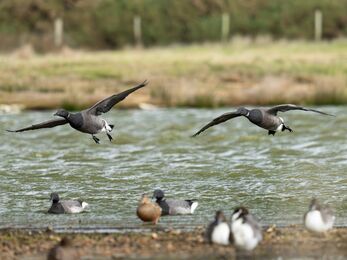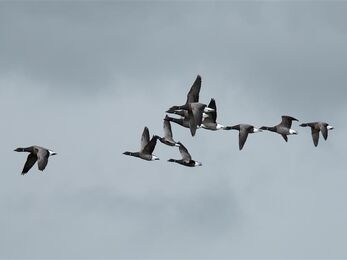Thousands of over-wintering birds, including dark-bellied brent geese and black-tailed godwits, rely on the Solent’s rich, coastal grazing marshes, sheltered estuaries, mudflats, and saltmarshes to rebuild their strength. These habitats provide safe spaces to rebuild strength, replenish energy reserves, and stabilise the gut microbes that are vital for digesting food after migration.
The Trust is asking people visiting the coast to help by avoiding any activity that forces birds to move or fly unnecessarily, including approaching too closely, letting dogs off-lead, making loud noises, or being present near feeding and roosting areas.
Giving birds plenty of space allows them to feed and rest peacefully. Rest, just after, and before migration is critical for survival. Research shows that just ten interruptions a day can push birds into an energy deficit.
Tracé Cooper-Williams, Senior Nature Recovery Manager at Hampshire & Isle of Wight Wildlife Trust, said: “Now is a fabulous time to see geese and other shorebirds returning to our coast to spend the winter months here. However, migration is a costly exercise due to a process called temporary gut atrophy. This is when birds shrink their gut before long flights to make themselves lighter and use energy more efficiently.
“Migration really does take guts! When the birds arrive on our coast, many weigh only 50 per cent of the body weight they had when they left their breeding grounds. This incredible adaptation comes at a cost: during the first few weeks here, the birds need essential rest and time to feed, gradually rebuilding the size of their gut. At first, they can only eat small amounts, so any disturbance at this stage can truly mean life or death.
“We are appealing to the public to help us look after these birds by giving them space. If a bird is reacting to your presence, you are too close. By giving space, you are reducing the risk of a flight reaction, saving the bird precious energy stores and enabling it to build up reserves for the winter.”
Richie Ainger, Senior Ranger at Bird Aware Solent added: “Brent geese travel over 2,500 miles from Arctic Siberia to the Solent and they arrive exhausted and hungry. The good news is that we can make a difference, just by giving them lots of space so they can feed and rest without being disturbed”.
Currently, around 600 brent geese have arrived at Keyhaven Marshes, part of over 700 hectares of saltmarsh and foreshore managed by the Trust. These energy-packed habitats allow birds to regain strength for the winter and for their journey back to breeding grounds in spring.
The Trust is also seeking local volunteers to support surveys and engagement activities. More information is available here.


